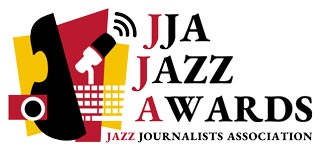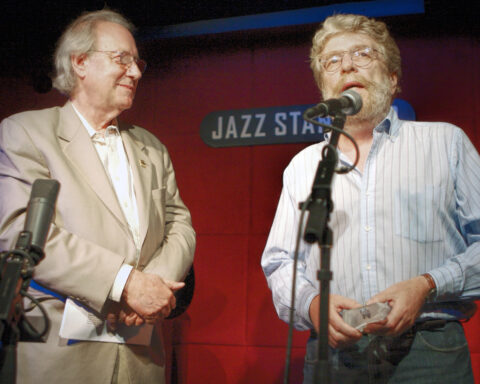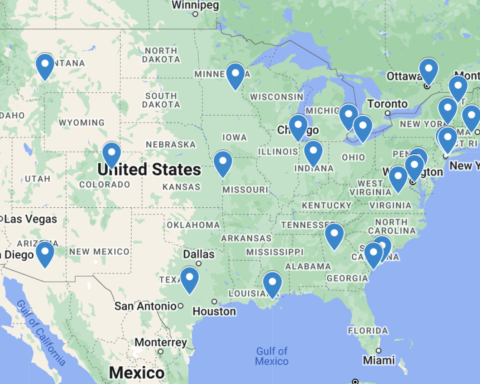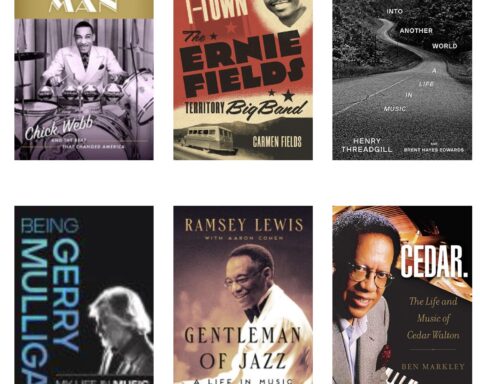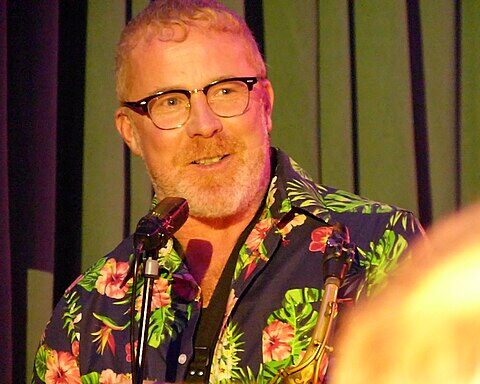The Jazz Journalists Association and its eyeJAZZ video news training project were in the spotlight during last week’s meeting of grantees of the Mid-Atlantic Arts Foundation’s JazzNEXT initiative, which funds eyeJAZZ and other projects that “incorporate technology in substantive and innovative approaches to audience development, communications, distribution, marketing and the building of support networks.”
Howard Mandel, president of the JJA, and JoAnn Kawell, the JJA’s web administrator and eyeJAZZ instructor, attended the day-long meeting (and a next-day interview for jazz.NEXT documentation), describing the progress of eyeJAZZ, currently in its eighth week of online webinars for nascent videographers who are producing short-form news pieces about their local artists, scenes and communities that are suitable for web distribution. Many of these videos have already been posted at YouTube.com, Vimeo, and websites including a JazzTimes blog and the pages of presenters such as CapitalBop.com (in Washington, D.C.). Following instruction by Bret “JazzVideoGuy” Primack, independent Chicago-based filmmaker Floyd Webb, Kawell and Mandel, some 40 eyeJAZZ trainees, mostly situated in North America, are turning HD pocket video cameras on jazz where it’s not typically expected. News and views of jazz have come from northern Georgia, Massachusett’s Pioneer Valley, north coastal California, central Colorado and Naimo, British Columbia, as well as New York, Philadelphia, D.C., Chicago, Detroit, the Bay Area, Portland OR, New Orleans, Ottawa, Montreal and Toronto and Taiwan.
Representatives of National Public Radio, the National Federation of Community Broadcasters, the Monterey and Savannah Jazz Festivals, the Manchester Craftsmans Guild, the Walker Museum of Art in Minneapolis, Symphony Space (an NYC music presenter), Berklee College of Music and trumpeter Dave Douglas of Greenleaf Records were also at the day-long meeting chaired by MAAF program officer Sara Donnelly and attended also by representatives of the Doris Duke Charitable Foundation, which funded Jazz.NEXT for three years.
At the MAAF council, representatives shared information about their funded projects, which range from the digitalization of NFCB member stations’ jazz archives to the creation of a record company app for mobile digital devices, which Greenleaf will offer as a template to other artists running their own record companies. The eyeJAZZ project was of significant interest to the Walker’s curator of performance Philip Bither, who said his staff had tried to craft short-form videos for promotional purposes but was pleased to know there were professionals available to do so who had gone through eyeJAZZ training, and Savannah’s Rob Gibson, who had himself learned software programs for video editing so as to be able to populate his festival’s website with short videos of scheduled attractions. A film resulting from the Savannah efforts, You Got To Swing, has been accepted for screening at film festivals, Gibson says.
The JJA received its MAAF funding in the second round of Jazz.Next grants. These funds have been used to purchase and distribute Kodak zi8 pocket cameras to 35 “official” trainees, selected from an international field of 180 applicants, and to pay expenses for the training program. Mandel, Kawell, Primack and Webb conduct weekly two-hour webinars, which have interactive components and are now archived for public viewing. The instructors also maintain an active (private) forum for the trainees on Facebook, where they critique student videos, and they schedule one-on-one online sessions with trainees encountering specific problems in their shooting and editing sessions.
After having selected the cadre of 35 “official” trainees, the instructors invited everyone who had applied to the program to participate in the training program by viewing the online webinars and submitting videos for instructor critique; 60 of the applicants signed up to do so. Many of these participants have by now shot and edited at least one eyeJAZZ video. Some of the finished videos can be viewed at eyeJAZZ.tv.

